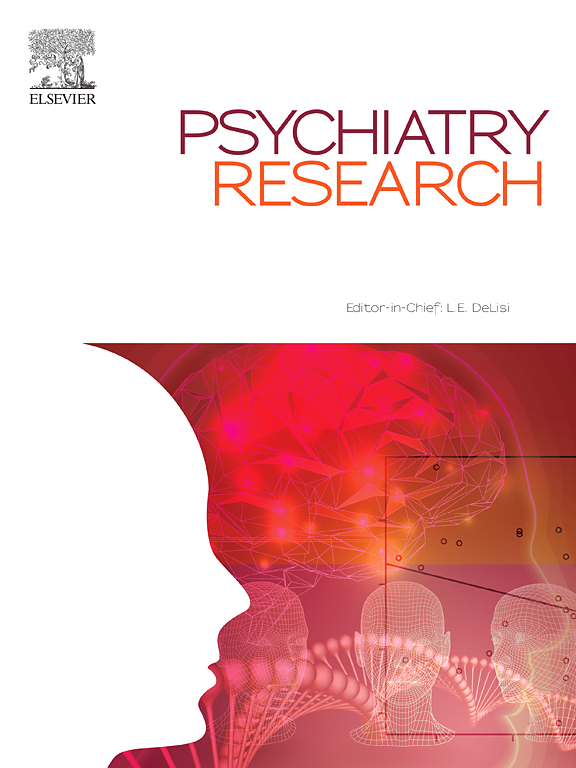Fibromyalgia and post-traumatic stress disorder: A systematic review
IF 3.9
2区 医学
Q1 PSYCHIATRY
引用次数: 0
Abstract
Introduction
Fibromyalgia (FM) is considered an idiopathic condition characterised by diffuse and chronic musculoskeletal pain. Emerging evidence suggests that exposure to traumatic events may be associated with an increased likelihood of developing this multifaceted disorder. This systematic review examines the role of post-traumatic stress disorder (PTSD) in the etiology and progression of FM, aiming to synthesise findings from published literature on the PTSD-FM association over the past thirty years.
Methods
This review was conducted in accordance with the PRISMA guidelines. Relevant studies published between 1993 and 2023 were identified through a comprehensive search of the PubMed, ProQuest, and Scopus databases. Inclusion and exclusion criteria were applied, yielding a final selection of 20 articles. These studies were assessed based on their methodological quality, as well as the relevance of their objectives, sample populations, and findings.
Results
The results indicate an association between FM and PTSD, with some evidence linking PTSD to greater FM symptom severity. Limited evidence also suggests an association between PTSD and increased likelihood of FM development.
Conclusion
These findings highlight the need for an interdisciplinary, biopsychosocial approach to the prevention, diagnosis, and treatment of FM and PTSD. Methodological limitations were identified across the included studies, such as the absence of a biopsychosocial perspective, reliance on self-reported PTSD assessments, small and unrepresentative samples, and inconsistent control of psychological factors. Future research should adopt rigorous diagnostic methods, incorporate biopsychosocial frameworks, use larger and more representative samples, and employ longitudinal designs to enhance generalisability and deepen understanding of the relationship between PTSD and FM.
纤维肌痛和创伤后应激障碍:系统综述
纤维肌痛(FM)被认为是一种特发性疾病,其特征是弥漫性和慢性肌肉骨骼疼痛。新出现的证据表明,暴露于创伤性事件可能与发展这种多方面障碍的可能性增加有关。这篇系统综述探讨了创伤后应激障碍(PTSD)在FM的病因和进展中的作用,旨在综合过去三十年中关于PTSD-FM关联的已发表文献的发现。方法本综述按照PRISMA指南进行。通过对PubMed、ProQuest和Scopus数据库的全面检索,确定了1993年至2023年间发表的相关研究。采用纳入和排除标准,最终选出20篇文章。这些研究是根据其方法学质量,以及其目标、样本人群和研究结果的相关性进行评估的。结果表明FM与PTSD之间存在关联,有证据表明PTSD与FM症状的严重程度有关。有限的证据也表明PTSD与FM发展可能性增加之间存在关联。结论这些研究结果强调需要跨学科的、生物心理社会的方法来预防、诊断和治疗FM和PTSD。在纳入的研究中发现了方法学上的局限性,例如缺乏生物心理社会视角,依赖于自我报告的PTSD评估,样本小且不具代表性,以及对心理因素的控制不一致。未来的研究应采用严格的诊断方法,结合生物心理社会框架,使用更大更有代表性的样本,并采用纵向设计,以提高PTSD与FM关系的普遍性,加深对PTSD与FM关系的理解。
本文章由计算机程序翻译,如有差异,请以英文原文为准。
求助全文
约1分钟内获得全文
求助全文
来源期刊

Psychiatry Research
医学-精神病学
CiteScore
17.40
自引率
1.80%
发文量
527
审稿时长
57 days
期刊介绍:
Psychiatry Research offers swift publication of comprehensive research reports and reviews within the field of psychiatry.
The scope of the journal encompasses:
Biochemical, physiological, neuroanatomic, genetic, neurocognitive, and psychosocial determinants of psychiatric disorders.
Diagnostic assessments of psychiatric disorders.
Evaluations that pursue hypotheses about the cause or causes of psychiatric diseases.
Evaluations of pharmacologic and non-pharmacologic psychiatric treatments.
Basic neuroscience studies related to animal or neurochemical models for psychiatric disorders.
Methodological advances, such as instrumentation, clinical scales, and assays directly applicable to psychiatric research.
 求助内容:
求助内容: 应助结果提醒方式:
应助结果提醒方式:


